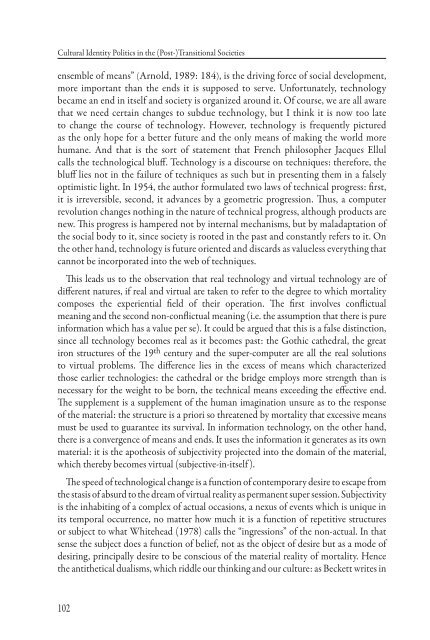Cultural Identity Politics in the (Post-)Transitional Societies
Cultural Identity Politics in the (Post-)Transitional Societies
Cultural Identity Politics in the (Post-)Transitional Societies
Create successful ePaper yourself
Turn your PDF publications into a flip-book with our unique Google optimized e-Paper software.
<strong>Cultural</strong> <strong>Identity</strong> <strong>Politics</strong> <strong>in</strong> <strong>the</strong> (<strong>Post</strong>-)<strong>Transitional</strong> <strong>Societies</strong><br />
ensemble of means” (Arnold, 1989: 184), is <strong>the</strong> driv<strong>in</strong>g force of social development,<br />
more important than <strong>the</strong> ends it is supposed to serve. Unfortunately, technology<br />
became an end <strong>in</strong> itself and society is organized around it. Of course, we are all aware<br />
that we need certa<strong>in</strong> changes to subdue technology, but I th<strong>in</strong>k it is now too late<br />
to change <strong>the</strong> course of technology. However, technology is frequently pictured<br />
as <strong>the</strong> only hope for a better future and <strong>the</strong> only means of mak<strong>in</strong>g <strong>the</strong> world more<br />
humane. And that is <strong>the</strong> sort of statement that French philosopher Jacques Ellul<br />
calls <strong>the</strong> technological bluff. Technology is a discourse on techniques: <strong>the</strong>refore, <strong>the</strong><br />
bluff lies not <strong>in</strong> <strong>the</strong> failure of techniques as such but <strong>in</strong> present<strong>in</strong>g <strong>the</strong>m <strong>in</strong> a falsely<br />
optimistic light. In 1954, <strong>the</strong> author formulated two laws of technical progress: first,<br />
it is irreversible, second, it advances by a geometric progression. Thus, a computer<br />
revolution changes noth<strong>in</strong>g <strong>in</strong> <strong>the</strong> nature of technical progress, although products are<br />
new. This progress is hampered not by <strong>in</strong>ternal mechanisms, but by maladaptation of<br />
<strong>the</strong> social body to it, s<strong>in</strong>ce society is rooted <strong>in</strong> <strong>the</strong> past and constantly refers to it. On<br />
<strong>the</strong> o<strong>the</strong>r hand, technology is future oriented and discards as valueless everyth<strong>in</strong>g that<br />
cannot be <strong>in</strong>corporated <strong>in</strong>to <strong>the</strong> web of techniques.<br />
This leads us to <strong>the</strong> observation that real technology and virtual technology are of<br />
different natures, if real and virtual are taken to refer to <strong>the</strong> degree to which mortality<br />
composes <strong>the</strong> experiential field of <strong>the</strong>ir operation. The first <strong>in</strong>volves conflictual<br />
mean<strong>in</strong>g and <strong>the</strong> second non-conflictual mean<strong>in</strong>g (i.e. <strong>the</strong> assumption that <strong>the</strong>re is pure<br />
<strong>in</strong>formation which has a value per se). It could be argued that this is a false dist<strong>in</strong>ction,<br />
s<strong>in</strong>ce all technology becomes real as it becomes past: <strong>the</strong> Gothic ca<strong>the</strong>dral, <strong>the</strong> great<br />
iron structures of <strong>the</strong> 19 th century and <strong>the</strong> super-computer are all <strong>the</strong> real solutions<br />
to virtual problems. The difference lies <strong>in</strong> <strong>the</strong> excess of means which characterized<br />
those earlier technologies: <strong>the</strong> ca<strong>the</strong>dral or <strong>the</strong> bridge employs more strength than is<br />
necessary for <strong>the</strong> weight to be born, <strong>the</strong> technical means exceed<strong>in</strong>g <strong>the</strong> effective end.<br />
The supplement is a supplement of <strong>the</strong> human imag<strong>in</strong>ation unsure as to <strong>the</strong> response<br />
of <strong>the</strong> material: <strong>the</strong> structure is a priori so threatened by mortality that excessive means<br />
must be used to guarantee its survival. In <strong>in</strong>formation technology, on <strong>the</strong> o<strong>the</strong>r hand,<br />
<strong>the</strong>re is a convergence of means and ends. It uses <strong>the</strong> <strong>in</strong>formation it generates as its own<br />
material: it is <strong>the</strong> apo<strong>the</strong>osis of subjectivity projected <strong>in</strong>to <strong>the</strong> doma<strong>in</strong> of <strong>the</strong> material,<br />
which <strong>the</strong>reby becomes virtual (subjective-<strong>in</strong>-itself ).<br />
The speed of technological change is a function of contemporary desire to escape from<br />
<strong>the</strong> stasis of absurd to <strong>the</strong> dream of virtual reality as permanent super session. Subjectivity<br />
is <strong>the</strong> <strong>in</strong>habit<strong>in</strong>g of a complex of actual occasions, a nexus of events which is unique <strong>in</strong><br />
its temporal occurrence, no matter how much it is a function of repetitive structures<br />
or subject to what Whitehead (1978) calls <strong>the</strong> “<strong>in</strong>gressions” of <strong>the</strong> non-actual. In that<br />
sense <strong>the</strong> subject does a function of belief, not as <strong>the</strong> object of desire but as a mode of<br />
desir<strong>in</strong>g, pr<strong>in</strong>cipally desire to be conscious of <strong>the</strong> material reality of mortality. Hence<br />
<strong>the</strong> anti<strong>the</strong>tical dualisms, which riddle our th<strong>in</strong>k<strong>in</strong>g and our culture: as Beckett writes <strong>in</strong><br />
102




